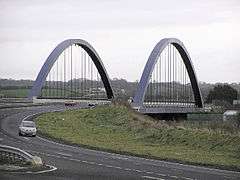Toome
| Toome | |
|---|---|
 The bridge over the River Bann at Toome (built 2004) | |
 Toome | |
| Toome shown within Northern Ireland | |
| Population | 781 (2011 Census) |
| Irish grid reference | H9990 |
| District | |
| County | |
| Country | Northern Ireland |
| Sovereign state | United Kingdom |
| Post town | ANTRIM |
| Postcode district | BT41 |
| Dialling code | 028 |
| EU Parliament | Northern Ireland |
| UK Parliament | |
| NI Assembly | |
Toome or Toomebridge (from Irish: Tuaim, meaning "tumulus"),[2] is a small village and townland on the northwest corner of Lough Neagh in County Antrim, Northern Ireland. It lies in the civil parish of Duneane in the former barony of Toome Upper,[2] and is part of Antrim borough council. It had a population of 781 people in the 2011 Census.[3]
History
Roddy McCorley, a Presbyterian radical, was a local of the parish of Duneane. He fought as a United Irishmen in the Rebellion of 1798 against British rule in Ireland but was captured. He was executed on February 28, 1800, "near the bridge of Toome", which had been partially destroyed by rebels in 1798 to prevent the arrival of reinforcements from west of the River Bann. His body was then dissected by the British and buried under the road that went from Belfast to Derry. In 1852, when the road was being reconstructed, a nephew had McCorley's body exhumed and given a proper burial in an unmarked grave in Duneane. A memorial in honour of McCorley now stands in Toome as you enter the village from County Londonderry. His story became the subject of a popular song written in 1898 by Ethna Carbery.
Economy
- The largest industry in Toome is eel fishing, supplying the European market. The eels come from the Sargasso Sea in the Atlantic Ocean to Lough Neagh to mate. The eel fisheries have been commemorated in a number of poems by Seamus Heaney.
- Within the last century mining for diatomite has developed as extensive deposits of diatomite are found in the Toome area. This mineral was used as an absorbent for gelignite and for toothpaste.
- The expanding Toome Business Park has been helping the economy of the village for over the past ten years.
People
- Motorcycle road racers Michael, John and Eugene Laverty are from Toome.
- Willie John McBride, world-famous Rugby Union player, is a native of Toome but now lives in Ballyclare.
- Robin John Bailie (1937-), solicitor, businessman and former Ulster Unionist Party and Alliance politician.
Sport
The local Gaelic Athletic Association club in the area is Erins Own, Cargin.
Transport

- Toome had long been a bottleneck to traffic on the main Belfast to Derry road route. Construction of a bypass began in May 2002 and was completed in March 2004, shortening journey times and relieving congestion in the village.
- Toome Bridge railway station was opened on 10 November 1856, shut for passenger traffic on 28 August 1950 and shut altogether on 1 October 1959.[4]
Population
2011 Census
In the 2011 Census Toome had a population of 781 people (263 households).[3]
2001 Census
Toome is classified as a small village or hamlet by the NI Statistics and Research Agency (NISRA) (i.e. with population between 500 and 1,000 people). On Census day (29 April 2001) there were 722 people living in Toome. Of these:
- 27.2% were aged under 16 years and 10.9% were aged 60 and over
- 48.8% of the population were male and 51.3% were female
- 96.3% were from a Catholic background and 2.9% were from a Protestant background
- 6.2% of people aged 16–74 were unemployed
For more details see: NI Neighbourhood Information Service
See also
References
- ↑ "Leevin in tha Day of Quaen Victoria: Kintra dwallin-hooses". National Museums Northern Ireland. Ulstèr Fowk an Convoyin Museum. Retrieved 5 May 2017.
- 1 2 - Toomebridge
- 1 2 "Toome". Census 2011 Results. NI Statistics and Research Agency. Retrieved 22 April 2015.
- ↑ "Toome station" (PDF). Railscot - Irish Railways. Retrieved 2007-11-24.
External links
- River Bann, Ireland - Toome visitor information
- Landscapes Unlocked - Aerial footage from the BBC Sky High series explaining the physical, social and economic geography of Northern Ireland.
